Recycling Takes a Rare Time-Out
By Huang Xiao-zhe (黃筱哲) and Cai Yu-xuan (蔡瑜璇)
Translated by Rose Ting
Photos by Huang Xiao-zhe (黃筱哲)
Recycling Takes a Rare Time-Out
By Huang Xiao-zhe (黃筱哲)
Cai Yu-xuan (蔡瑜璇)
Translated by Rose Ting
Photos by Huang Xiao-zhe (黃筱哲)
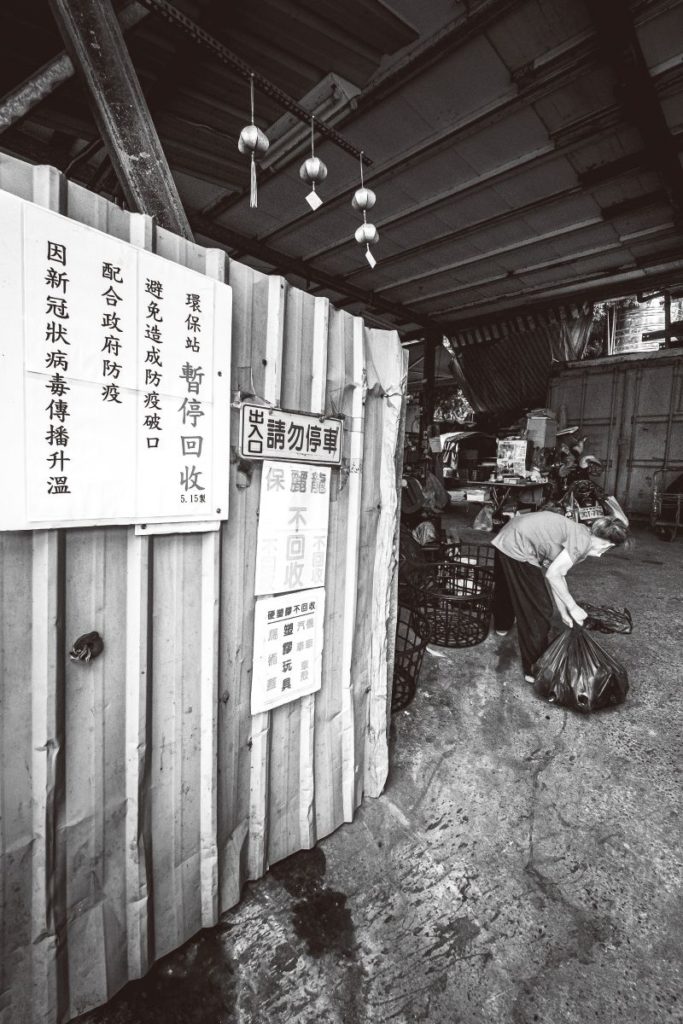
I started photographing Tzu Chi recycling volunteers and their work nearly a decade ago. During all that time, I’ve never seen any sign at a Tzu Chi recycling station announcing they were temporarily turning away all recycling. But that happened in May 2021, as shown by the sign in the far left of the photo above.
When the number of COVID-19 cases suddenly increased in Taiwan in May 2021, the government raised its coronavirus alert to level three—its second highest level—to contain the spread of the disease. It remained at that level for more than two months. It wasn’t until the epidemic had subsided that the alert was reduced to level two, on July 27.
That outbreak and the resulting restrictions affected every sector of society. Even Tzu Chi recycling stations, which had never closed their doors before, were forced to temporarily cease operation. Recycling work had long been a part of many volunteers’ daily life. I wondered how they were coping during this unexpected time-out.
I visited several recycling stations in my hometown of Tainan, southern Taiwan, to take a look. All the team leaders I met told me that their volunteers had expressed a strong desire to get back into the recycling stations. They felt helpless; they were eager to serve, but couldn’t under the current situation. The volunteers were less concerned about the risk of contracting COVID-19 than about recyclable materials being thrown away. They worried about the environmental cost that would result if the recyclable materials were not properly reclaimed, and they were firmly convinced that their recycling work couldn’t wait. I could feel their love for the environment and was deeply touched by it.
Taking COVID precautions seriously
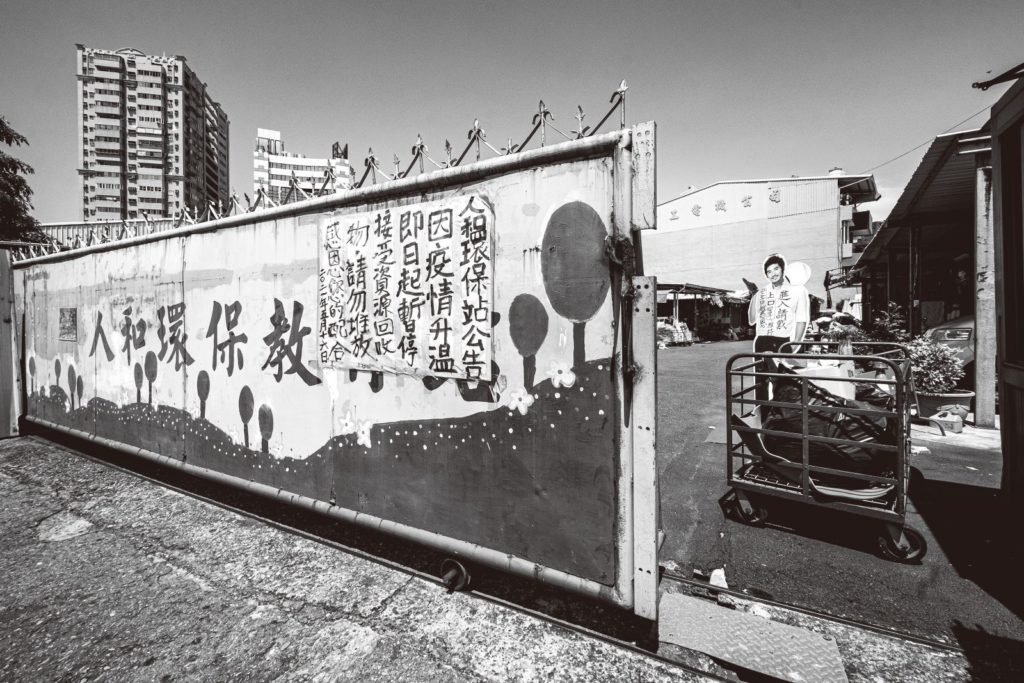
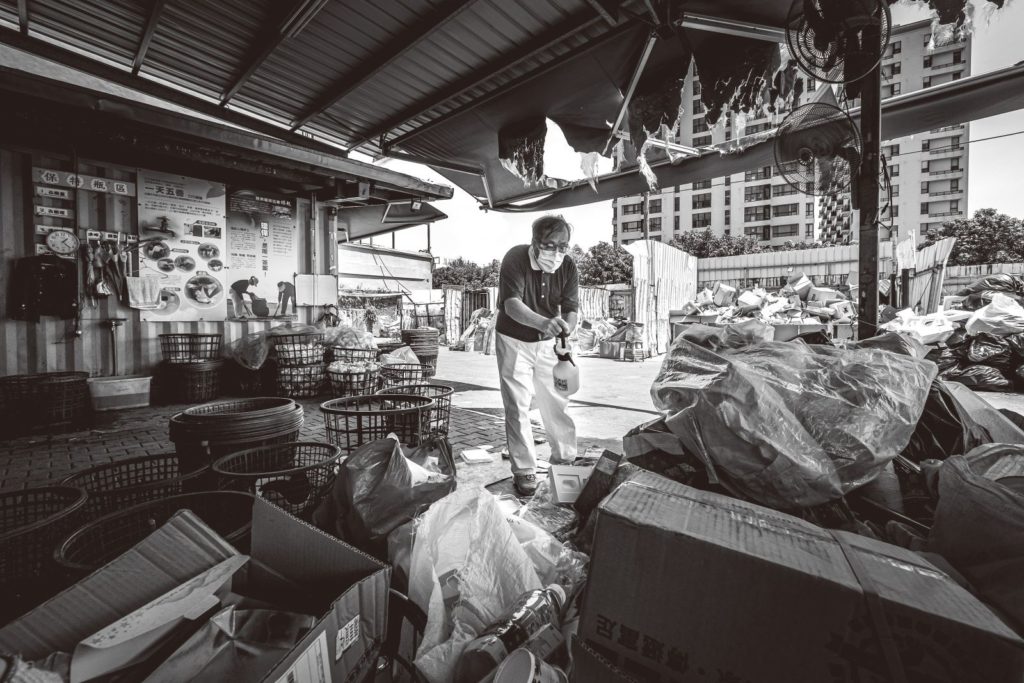
I had heard that the Renhe Recycling Station did a great job of enforcing COVID precautions, so I went there for a look. Volunteer Liu Yu-wen (劉玉文) told me about the safety measures they had taken during this time. For example, they suspended their recycling collection rounds as soon as the level three alert was expanded from Taipei and New Taipei City to the entire island, on May 19. They also had the entire station sanitized, and closed it for the first time. Despite all that, some volunteers continued to show up to sort recycling. Only then did Liu realize that many volunteers had keys to the station. He had no choice but to change the lock on the front door. He only changed it back when the government eased some of its restriction measures on July 12.
Even though the station was not yet open to the public, some people insisted on taking their recyclable garbage there. Volunteers decided to place a four-wheeled pushcart near the partially open entrance door in which the public could leave their recycling. Volunteers drew attention to the cart and made its purpose known by erecting a recycled cutout figure with explanatory notes next to the cart. The simple strategy killed two birds with one stone: it prevented people from dropping their garbage outside the door and minimized human contact at the same time.
Many volunteers couldn’t wait to get back to work after the COVID restrictions were partially lifted on July 12. They phoned Liu asking when they could start reporting to the station. Since there was still a limit on the number of people that could volunteer there at the same time—five at the most—volunteers had to take turns serving there. They were so happy to finally be able to return to their posts that they dutifully followed the safety protocols and waited their turn.
An empty sorting area
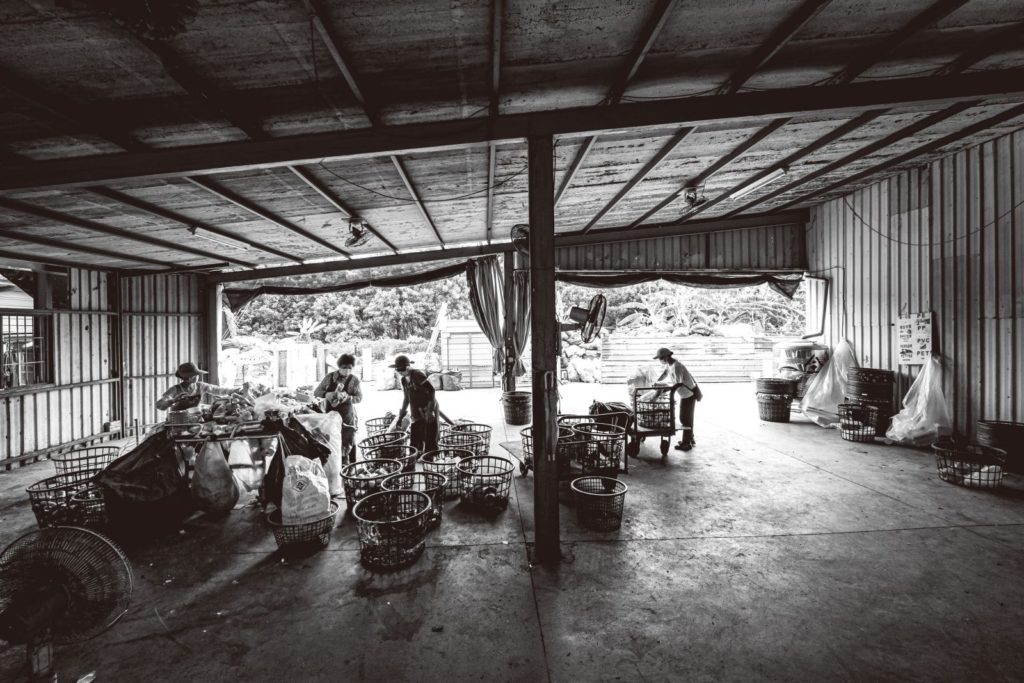
I visited the Annan Recycling Station on July 23. I’m very familiar with this station. As a kid I often went there with my mom, who is a volunteer there. I visited the station from time to time as an adult too. There was always a small mountain of recycling, taller than a full-grown adult, in the sorting area within a corrugated metal shed there. It seemed there were always more recyclables than could ever be sorted. However, during my visit on July 23, I saw the shed standing practically empty—the mountain of mixed recyclables was gone. There were more plastic baskets lying around that were used to contain sorted recycling than there was garbage that needed to be sorted. Even the number of volunteers serving there was down to no more than five, due to the cap on the size of indoor gatherings.
I was feeling a little lonely and forlorn, taking in the scene in front of me, when I heard the volunteers say as they went about their work: "A lot of recyclables are produced every day. Where will they go if no one goes to collect them?" I could hear the worry in their voices. It was their fervent wish that the epidemic would soon fade away so that their work could return to normal.
Never at loose ends for something to do
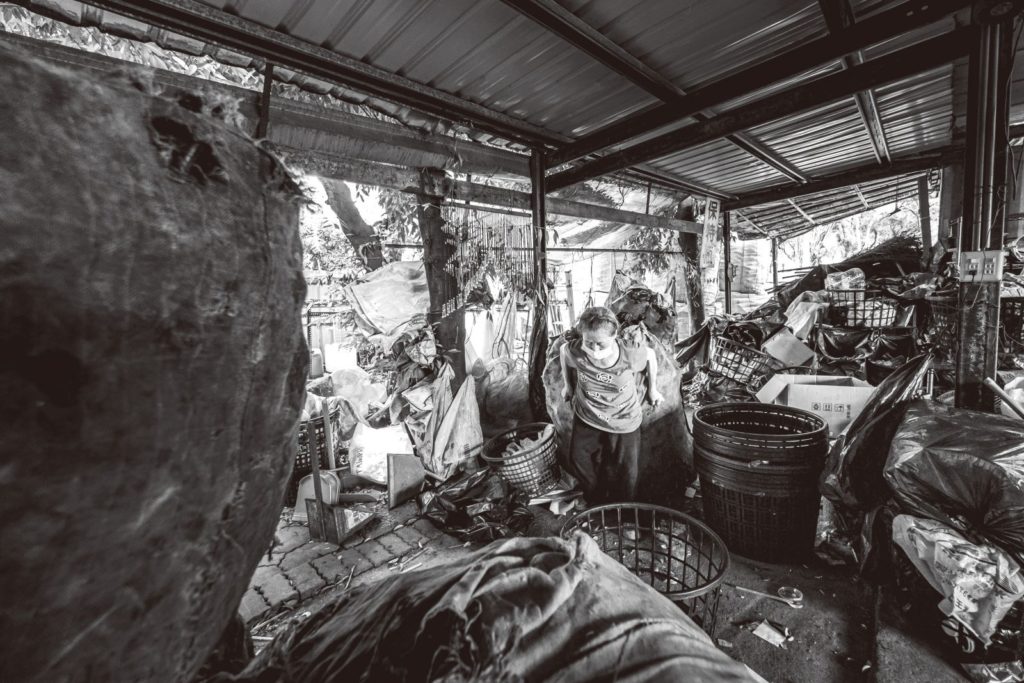
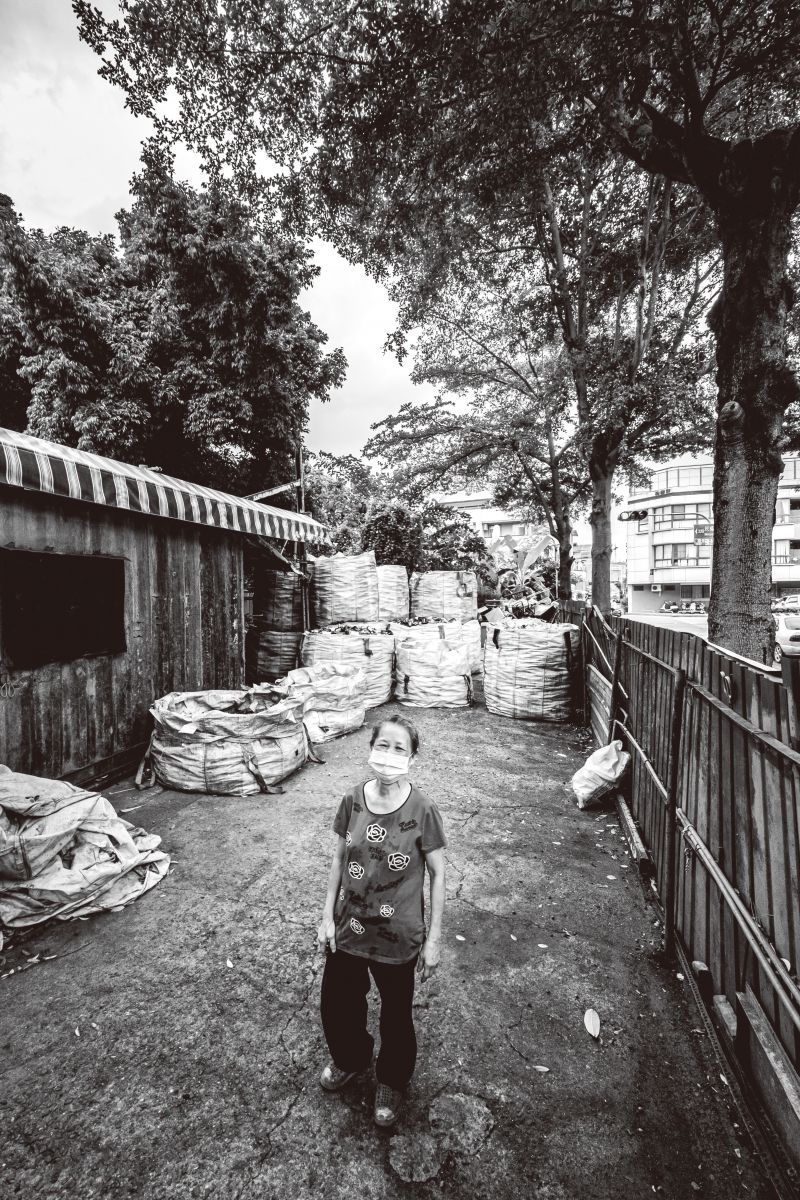
Su Yu-yun (蘇玉雲) is a volunteer at the Dingmei Recycling Station. I photographed her and wrote a piece about her in 2016. I still vividly remember her as she visited nightclubs in the wee hours of the morning, collecting empty liquor bottles. I asked her on a visit to the Dingmei Recycling Station on July 22, 2021, if her work had been impacted when the pubs and nightclubs had been forced to close due to the pandemic. "There are presently no empty liquor bottles to collect," she answered matter-of-factly. I followed her to the area where used liquor bottles were placed at the recycling station and found it a lot emptier than before. I thought that since her workload must have been greatly reduced, she could use this rare time off to take a good rest, but she surprised me by saying, "I still leave my home every morning before two now to start a day’s work. I pick up recyclables at some fixed collection points before coming to the station." I was amazed that even at a time like this, she refused to take it easy and still actively sought out work to do.
She was as busy as a bee, taking care of all sorts of work, as I followed her around the station. Due to the limit on the number of volunteers that could serve there during this time, she had to do others’ work as well, which explained her activity. I saw her sorting plastic bags one moment, moving bags filled with plastic bottles to where they belonged the next, and sweeping a sorting area the next. "It looks like you’re just as busy as ever," I commented. She answered casually, "There’s enough work around here to keep me off the street."
Finally the day is here
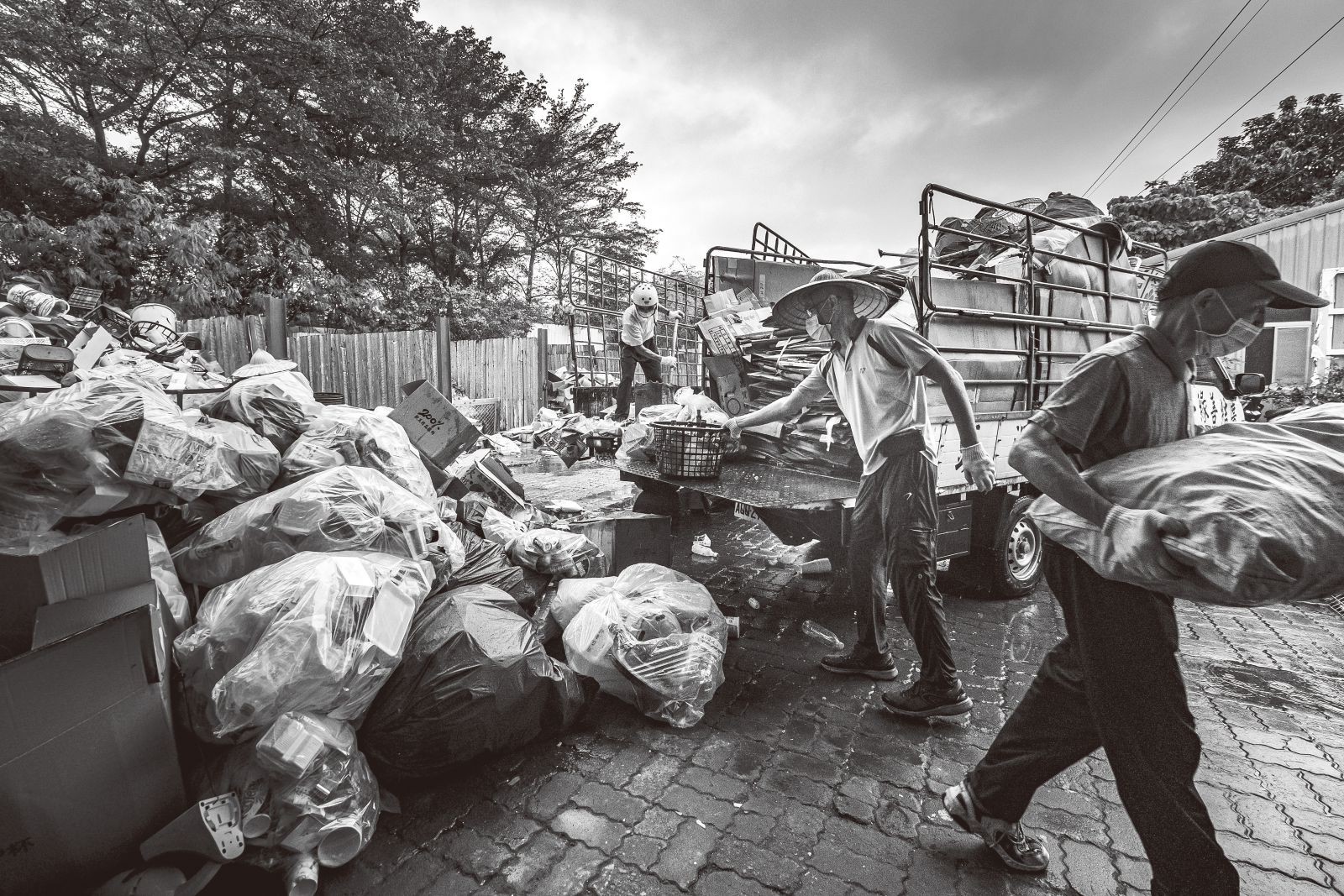
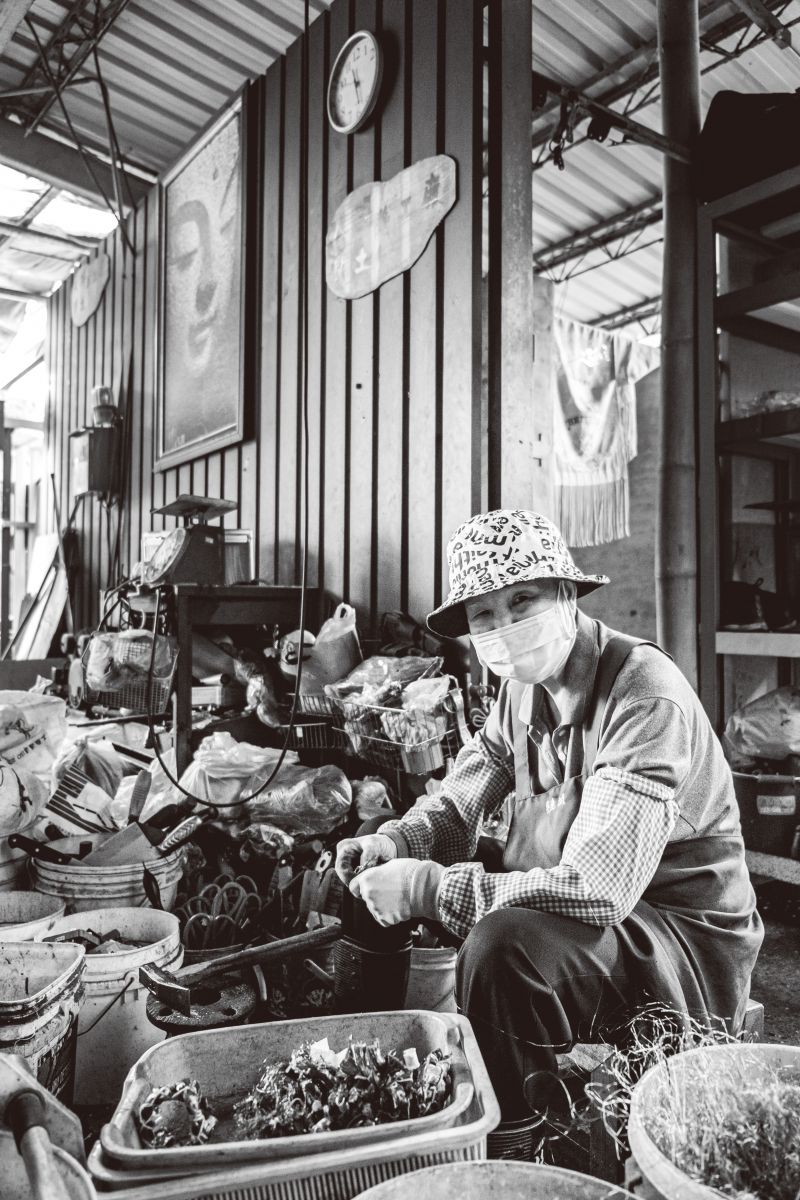
The COVID-19 surge in Taiwan gradually abated, so the pandemic alert was lowered to level two on July 27. Tzu Chi recycling stations across the island were finally able to resume operation. I visited the Kunshen Recycling Station one August morning to see what the station looked like to be finally back in business. The station had sent out two trucks that morning to bring back recycling from many collection points. Before long, a vacant area at the station was piled with bag after bag of recycling. Volunteers on-site immediately went to work, sorting the garbage by type. I was so happy to see the volunteers in their element giving of themselves. The sight greatly moved me. But the happiest people of all were the volunteers themselves.
Cai Yu-mei (蔡玉梅) is 82. Her face was lit up with the joy of finally being back in the station. Thinking back on those two months when she was forced to stay at home, she said, "I was bored, having nothing to do at home. I couldn’t wait to come back here. To keep my kids from worrying about me, I even got vaccinated against COVID. I’m as happy as could be that I can be back here where I belong."
Contact Us | Plan a Visit | Donate
8 Lide Road, Beitou 11259, Taipei, Taiwan
886-2-2898-9999
005741@daaitv.com
©Tzu Chi Culture and Communication Foundation
All rights reserved.
